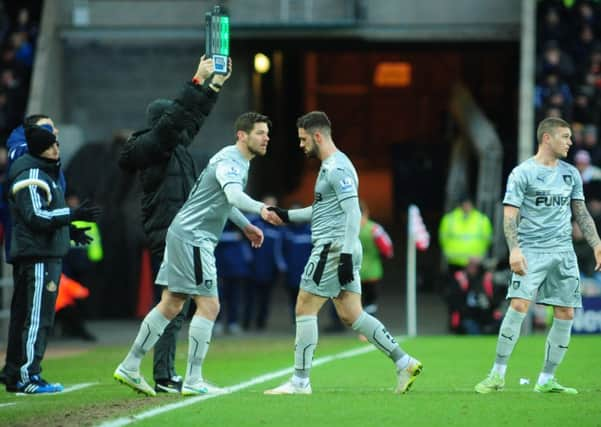Dyche: My substitutes theory


There are times when they make substitutions, and everything goes to plan.
Look back to December 2012 when Burnley were trailing 1-0 at home to derby rivals Blackburn Rovers.
Advertisement
Hide AdAdvertisement
Hide AdSam Vokes comes on, much to one fan’s annoyance, in the last minute, and pops up and heads the equaliser.
Last February Keith Treacy came off the bench to earn a point at Bournemouth, while Ross Wallace did similar at Leicester in September.
But there are times when they make changes, and it goes pear-shaped.
Last season Burnley were second best first half at Huddersfield.
Advertisement
Hide AdAdvertisement
Hide AdJunior Stanislas and Brian Stock came on for David Edgar and Michael Kightly, and within 10 minutes the Clarets were 2-0 down.
And with Burnley 3-2 up at Birmingham, Edgar replaced Scott Arfield and the hosts netted a late leveller.
Often, managers leave things as they are, and it works, or are perceived to have failed to be reactive enough, and it goes wrong.
There is no scientific evidence that supports the use, or not, of substitutes on the outcome of games, and different managers use them differently.
Advertisement
Hide AdAdvertisement
Hide AdSome Burnley fans have picked up on Sean Dyche’s conservative use of replacements.
Research from earlier this season showed he used fewest subs of 16 Premier League managers, who had been in charge of their side for at least 20 games - using 69.6% of his available changes, while Jose Mourinho used most - 98.9%.
And those statistics, with just 13 games remaining this term, have followed a similar pattern.
Dyche has, before the trip to Stamford Bridge, used 57 of 75 available to him - 76%.
Advertisement
Hide AdAdvertisement
Hide AdWhile Mourinho has used all three subs in each league game bar one, when he used two, so has used 98.6%.
Dyche also uses them later than his rivals - 28 of his 57 changes have been in the last 10 minutes of games this season.
Typically, he doesn’t overthink the statistics, as he said: “Substitutions have to be done for a reason - it’s not a statistical fact that subs guarantee a different outcome.
“We make a decision when we see fit.
“Obviously there are injuries etc, but we just make subs when we need to.
“Overall we’ve had pretty good outcomes from our changes.
Advertisement
Hide AdAdvertisement
Hide Ad“There are no guarantees, but often it is how you see and feel a game, and over the time we’ve been here, I think it’s been pretty healthy for us.
“There are times when we’ve changed it and it’s worked.
“I’m pretty happy with that side of things, but there’s no definitive answer on substitutes.”
Jonathan Liew looked at the issue for the Daily Telegraph in September, and found Opta, who studied every game at World Cups since France 98 and discovered teams losing by one goal at half-time increased their chances of a result with a sub at the break from 24 to 40%.
And Bret Myers, a professor from Pennsylvania, came up with the idea that using your three changes on 58, 73 and 79 minutes doubled your odds of getting a draw or win.
Advertisement
Hide AdAdvertisement
Hide AdDaniel Altman at BSports and Colin Trainor at StatsBomb found that Premier League substitutes score at a much higher rate than players who play the full 90 minutes - as did the players they replaced.
Some managers feel if it ain’t broke, don’t fix it. Others make changes for change’s sake to try and alter the feel of a game.
But in an era of squad rotation and multiple substitutions, Dyche’s players have shown they can go hard every game with a great deal of success.